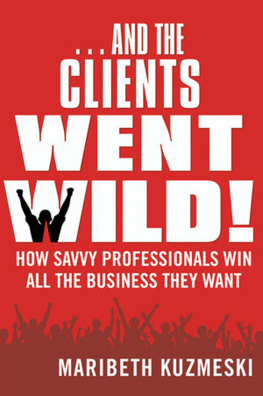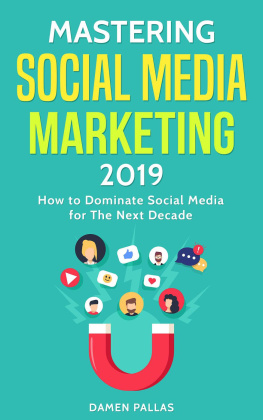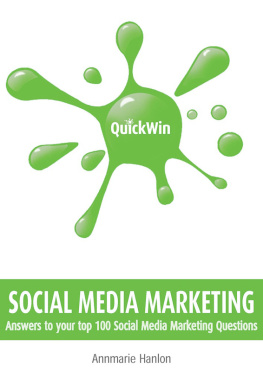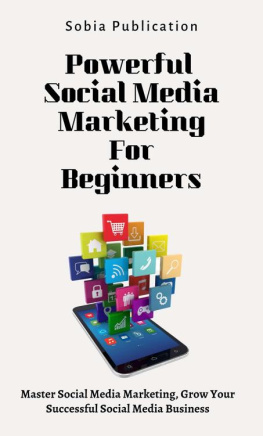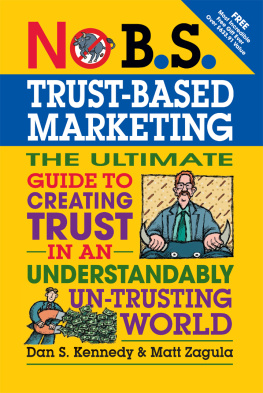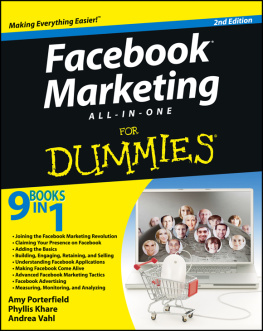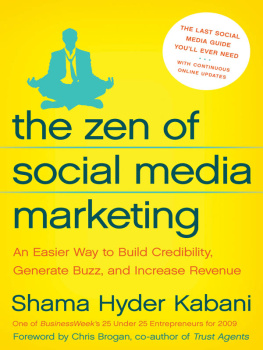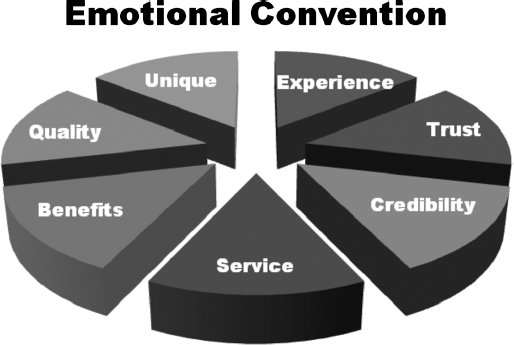Copyright
Copyright 2010 by Maribeth Kuzmeski. All rights reserved.
Published by John Wiley & Sons, Inc., Hoboken, New Jersey.
Published simultaneously in Canada.
No part of this publication may be reproduced, stored in a retrieval system, or transmitted in any form or by any means, electronic, mechanical, photocopying, recording, scanning, or otherwise, except as permitted under Section 107 or 108 of the 1976 United States Copyright Act, without either the prior written permission of the Publisher, or authorization through payment of the appropriate per-copy fee to the Copyright Clearance Center, Inc., 222 Rosewood Drive, Danvers, MA 01923, (978) 750-8400, fax (978) 646-8600, or on the web at www.copyright.com. Requests to the Publisher for permission should be addressed to the Permissions Department, John Wiley & Sons, Inc., 111 River Street, Hoboken, NJ 07030, (201) 748-6011, fax (201) 748-6008, or online at http://www.wiley.com/go/permissions.
Limit of Liability/Disclaimer of Warranty: While the publisher and author have used their best efforts in preparing this book, they make no representations or warranties with respect to the accuracy or completeness of the contents of this book and specifically disclaim any implied warranties of merchantability or fitness for a particular purpose. No warranty may be created or extended by sales representatives or written sales materials. The advice and strategies contained herein may not be suitable for your situation. You should consult with a professional where appropriate. Neither the publisher nor author shall be liable for any loss of profit or any other commercial damages, including but not limited to special, incidental, consequential, or other damages.
For general information on our other products and services or for technical support, please contact our Customer Care Department within the United States at (800) 762-2974, outside the United States at (317) 572-3993 or fax (317) 572-4002.
Wiley also publishes its books in a variety of electronic formats. Some content that appears in print may not be available in electronic books. For more information about Wiley products, visit our web site at www.wiley.com.
Library of Congress Cataloging-in-Publication Data:
Kuzmeski, Maribeth.
And the clients went wild!: how savvy professionals win all the business they want/ Maribeth Kuzmeski.
p. cm.
Includes index.
ISBN 978-0-470-60176-1 (cloth)
ISBN 978-0-470-76988-1 (ebk)
ISBN 978-0-470-76989-8 (ebk)
ISBN 978-0-470-76990-4 (ebk)
1. Customer services. 2. Success in business. I. Title.
HF5415.5.K89 2010
658.8dc22
2010005940
Printed in the United States of America
10 9 8 7 6 5 4 3 2 1
ACKNOWLEDGMENTS
I am grateful for everyone who has helped me take this book from concept to reality. A special thank you to my family for supporting me and my long hours writing and researching. To my parents for giving me the background, love, and experiences that have ultimately led to what I do today. To my clients who have given me many successes to write about, and to all of those who agreed to be interviewed for this book. To my publisher, John Wiley & Sons, Inc., and the key people there who have believed in my booksRichard Narramore and Matt Holt. To my developmental editor Christine Moore and production editor Lauren Freestone at John Wiley & Sons, Inc., as well as their marketing team. To my literary agent Jay Poynor who has enabled my writing to get published. And to Dottie DeHart and her public relations team at DeHart and Company. Finally, a special thank you to my readers, followers, and advocateswithout you all of this would be a big secret.
Aclyio!
INTRODUCTION
Businesses, business owners, and professionalsas well as sports teams and politicianspurposely reach out for people's recognition and affirmation that they have what others want . Some entities have gained elite status and positive exposure beyond their wildest dreams because they have possessed exactly what people need or desire. This kind of exposure by those who know them besttheir clients, fans, and constituentshas loudly proclaimed their worth.
But getting clients to literally "go wild" about you and what you do isfor most businesspeopleslightly more elusive. First, there must be some attribute worth going wild about . Then, you have to reach out to find those who may be interested in your message and offering. Clients don't randomly stumble on a business; smart companies communicate with a target audience, in the hopes they are listening and liking and buying.
This act of reaching out is marketing.
The American Marketing Association's official definition of marketing is, "the activity, set of institutions, and processes for creating, communicating, delivering, and exchanging offerings that have value for customers, clients, partners, and society at large."
In other words, marketing is about attracting qualified buyers to your products or services.
There have been hundreds of thousands of books and articles written about marketing tactics, new and traditional strategies, ideas and formulas to use in your business to attract clients, convince them to buy, and then get them to do it (buy) again. But when you cut through all of it, you'll find that the concept of marketing is really much simpler than all the definitions and words written on the topic. In fact, after spending more than two decades working in marketing in a variety of different industriesincluding politics, sports, and technology, and the past 15 years in financial servicesI have developed my own definition of marketing:
Marketing is the act of creating a compelling message for an offering that clients will buy and then won't be able to stop talking about .
It is not about implementing a hundred new tactics for reaching your target audience and hoping that one hits the target. It is about finding and using just a few strategies well .
Tapping Into The Emotional Connection
In order to truly get clients to go wild about your business, there must be an overriding and strong emotional connection; the same kind that you feel when you cheer for your favorite sports team, or support a cause that means something to you. You can get others to connect to your company, product, or service by emotionally energizing them through a passionate delivery of information. This is a true differentiator, because so few people and businesses actually act with this kind of enthusiasm. Thus, when someone is exhibiting passion about something, you take notice.
In my previous book, The Connectors (John Wiley & Sons, Inc., 2009), I wrote about how critically important it is to connect with others in business to fulfill your potential, create enormous opportunities, and gain personal success. But to take a step beyond being a connector is to define the specifics that will turn connections into sales, and buyers into fans. The relationship you develop with others is what creates this possibility. It is only when you tap into emotional bonds that people will truly "love you" and go wild about what you do.
Tapping into others' emotions requires that you elicit something called an "emotional convention" in the minds of those you want to buy from you. This happens when the seven basic factorsdepicted in come together to form a powerful, undeniable sentiment. The convention is ultimately the agreement between your conscious and subconscious mind to accept the merits and value of a certain person, company, or offering. If successful, the emotional convention results in an "I'm wild about you" conclusion.

